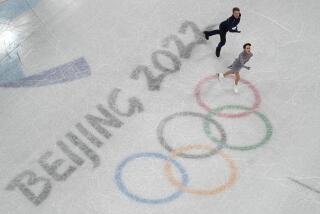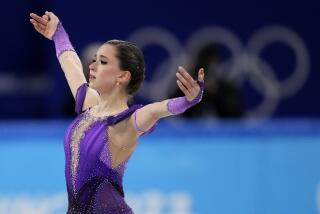Sochi Olympics: Men’s figure skating becomes rough-and-tumble event
SOCHI, Russia — Four of the toughest minutes at the Olympics happened Friday night, and, man, was it cold.
The best male figure skaters in Olympics skated under the flag of Zamboni. They tripped, they tumbled, they sprawled, they scraped. Afterward fans should have showered them not with teddy bears but dry pants.
None of the final six skaters in the men’s free skate completed a clean program, with three of them finding themselves with body parts other than their feet on the floor. Germany’s Peter Liebers was bouncing so hard his sequins turned to icicles.
FRAMEWORK: Best images from Sochi
In the end, it was less like figure skating and more like short track, with the winners recognizable only because they were still upright.
“You work your life to get here, you realize now it’s do or die, and a lot of nerves get in the way,” said longtime skating coach Frank Carroll.
Four of the toughest minutes at the Olympics don’t just tick, sometimes they chase, sometime they tackle and sometimes they win.
Friday night was one of those times, as Canada’s Patrick Chan breathlessly intoned while still sweating long after his big chill.
“Today was a tough day, we all made mistakes,” he said. “Maybe it’s the pressure of the Olympic Games.”
He looked frustrated, he sounded disappointed, yet this was one of the guys who actually won a medal.
Yeah, it was that bad, beginning with Yuzuru Hanyu of Japan, who started the evening in first place but fell twice in the first minute of his program, bit it bad, ice angels everywhere, a quiet chill descending over the Iceberg Skating Palace, setting the stage for second-place Chan.
“It did cross my mind that I might not win the gold,” said Hanyu.
But then, skating next, Chan executed one brilliant opening quadruple jump before also quickly stumbling twice, with only one hand on the ice twice saving him from becoming a skeleton driver.
“I was just happy to finish without falling,” he said.
Up next, down next, was fifth-place Liebers, who took the biggest bounce of all, clanging to the deck moments after he stepped on to the ice, which set the stage for the final skater of the night, the ponytailed American wonder Jason Brown.
It is Brown who surely persuaded some Valentine’s Day celebrants back in the U.S. to cuddle together on the couch in front of the television. Even tape-delayed, the kid is magic. A month ago, Brown, 19, put on a scintillating performance to the music from “Riverdance” at the U.S. National Championships, attracting more than 3.7 million views on YouTube. He was that rare skater gone viral.
He was doing the same routine Friday night. He was in sixth place, but enough doors had fallen off their hinges that a solid performance would have led him to a bronze medal, and he knew it.
“I knew more of the vicinity of what was going on,” Brown said. “I knew there was a chance of anything happening, it’s the Olympics, anything is possible, that’s what I kept telling myself.”
Yet the story that could have saved the night only cemented it, as Brown slipped and slid and two-footed a couple of jumps and wound up falling to ninth place.
“Of course I wish the score was higher,” he said. “But that would have happened if I skated better.”
Brown will certainly skate better. He will soon acquire the quadruple jump that is missing from his program and will allow him to seriously compete for gold. His shining face and excitable voice — “I am just so excited to be here!” he shouted in the interview area Friday — could be the look and sound of men’s skating for the next several years.
Carroll doesn’t coach Brown. But he gave him the ultimate, if unusual, young skater’s compliment when he said, “He’s a very determined boy, he’s very disciplined and he’s very obedient.”
In the end, Hanyu won the gold, Chan finished second, and Denis Ten of Kazakhstan skated past all the prone bodies to finish third. It will be remembered as a great night for those three, but it was not a great night for skating, and skating was partially to blame.
For the first time in recent memory, the Olympic free skate and short program were on consecutive days, a move done to make room for the new team competition. Bad idea. The skaters were wiped out, and it showed.
“For sure we had a tight turnaround,” said Chan. “I found it really hard to sleep last night after a such a late night.... It was tough to get rest and be ready to compete again today.”
Four of the toughest minutes at the Olympics don’t need any help. They can dominate all on their own. They did it again Friday. They usually do.
Twitter: @billplaschke
More to Read
Go beyond the scoreboard
Get the latest on L.A.'s teams in the daily Sports Report newsletter.
You may occasionally receive promotional content from the Los Angeles Times.







